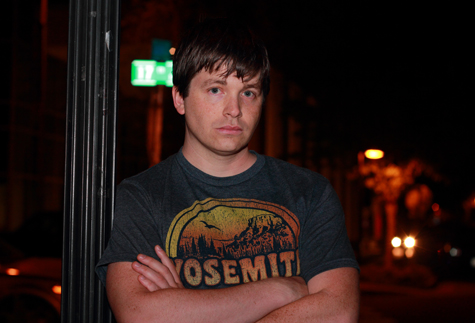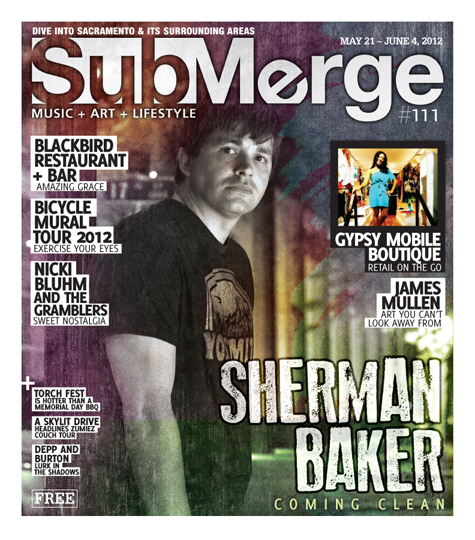Singer/Songwriter Sherman Baker bears his soul, battles addiction and existential dread…all in a day’s work
Words by Joseph Atkins – Photos by Amy Scott
Sherman Baker has lived multiple lives: struggling Los Angeles actor, recovering heroin addict, mild-mannered songwriter. Yet, there’s something about him that eschews both of the former descriptions and settles on the latter. Baker’s bigger than you imagine, listening to his new full-length, Seventeenth Street. His songs make him sound fragile, delicate; but in person his wide shoulders wrap a guitar while he sings upwards into a microphone. On stage he appears focused, intent. His look is exactly right for the sound, and the qualities of Baker’s sound ultimately condition the person he is.
Up close, it’s hard to tell how much of his personality is shaped by the quiet childhood he describes or the humility of a recovering addict, or where they bleed together. But their silent strength produces songs that slowly engulf one’s attention. Baker has enough self-confidence to expose himself, musically or otherwise, to talk honestly about his past and present. He has a soft-spoken manner that leaves a small impression. He’s like a subtle fill that piques one’s interest and becomes the highlight of a track after multiple listens. He’s normal yet unique, exotic in his low-key banality.
There’s a subtlety to his brand of song craft, a fusion of Dylan and Elliott Smith, with the tonal foundations of old school pop. His hooks and harmonies draw out the anguish and joy of repeated failure and angst, verse after verse. Below them, a series of string melodies and rhythms complement and exacerbate his vocal tracks, as the lyric content demands. There’s a focused tension on the struggle of daily life and survival, but I’d suggest this is bigger than just Baker’s struggle with himself. Seventeenth Street is relaxing, serious and thoughtful in its treatment of uncertain conditions–Baker’s and otherwise. We sat down over water and espresso to discuss these uncertainties, the ups and downs of growing.
On your opening track, “Constant Contact,” you plead repeatedly for the world to “stop posting things.” Did you check in on Foursquare when we got here?
I did not. I’ve been trying really hard to not be obvious like that. That song came from Facebook [where] an ex-girlfriend used to post about me while we were dating. She’d be like, “Don’t you hate when guys do this.” And then 20 lurker dudes would be like, “Yeah, fuck that guy.”
Do you have other songs about her?
Some of the other songs like, “Golden Gate Park,” “Man on a Wire” and “Sign of Light” are about a [different] ex-girlfriend whom I feel essentially left me for dead and didn’t seem to care that I was overdosing and attempting suicide.
In one of my favorite lines from “Sign of Life” you sing, “There’s no time for philosophy/When you’re fighting/To survive.” The next track follows with another line: “We have tried to be good/But I’d rather be wrong than dead inside.” What is the major antagonist in your life?
The new record is basically about heroin addiction. I was shooting heroin in 2008 to 2009. It wasn’t like, “Oh, Elliott Smith did it, or John Coltrane.” It was a simple addict progression from Vicodin to heroin. A typical Intervention episode was my life. I went to rehab, and after six or seven weeks of horror, I finally came out. The last two years I’ve been moving away from it. I tried to off myself. I was put in a mental hospital. The tension is me trying to fight existential dread.
Yours is actually a success story. Many addicts never even get to rehab. How were you able make the decision to get clean and stay that way?
It’s a daily struggle to stay clean, but I need to in order to survive. There isn’t a way to abuse opiates that doesn’t end in death or severe impairment. My uncle was kind enough to pay for me to go after I asked him for help. It was in L.A. I needed to get out of town. I went a long way from any dealers or money. I was forced to spend a month in one bed crying, shitting and puking on myself. Literally. It was so incredibly painful emotionally; I have felt a little bit numbed ever since. But I’m also certainly a much stronger person. I’m lucky.
I think really great artists tend to be addicted to creating. Do you feel like overcoming one addiction has allowed you to focus your attention more into your musicianship?
One hundred percent. On a physical level, my energy is up; it’s like night and day. I’ve been looking at my music like an athlete–how can I get better every day? Quitting smoking, writing every day, practicing every day, I’m always thinking about what things are helping me. I have a drive to write and make music that is certainly not rational. I’m not making money. Music is my art.
You’re releasing the album yourself. How’d it all come together?
My father died, which opened up money from my family that wasn’t being used for his medical care. I had a really low budget. I recorded a lot of it at my uncle’s house. He’s got a really big place up in Granite Bay. We actually did some of the drums. All the guitars, all the vocals, all the bass–everything I did–was done there.
We mixed at The Hangar and did some of the live drums and bass there. Matt McCord played drums, and Kris Anaya [Doom Bird] played bass on a few songs. Robert “Flossy” Cheek did the mixing.
There’s a definite Elliott Smith influence on the record, but the recording process sounds a lot like his process as well.
Elliott Smith would be a good analogy except I don’t play drums–minus the brilliance factor.
Losing your father seems like a big moment in your narrative. Are there points on the new CD where his loss is felt?Â
Yes, “Lonely Star” is about him to some degree. The bridge lyrics, “Where is the green light?/The future you told me of?” is a reference to The Great Gatsby’s last page about the green light of the dock. It was my father’s favorite book. A lot of the record is about mortality in some way. That might be part of the problem with selling it.Â
What happens if you never sell all the CDs you print?
I’m used to disappointment. If people don’t want to buy my music, I can’t force them to… I’m pretty reconciled to living a low income, humble lifestyle, regardless.
Do you still believe in those divisions between DIY, indie and major labels?
Not really. Death Grips are the latest example of a “big deal,” and they’re as DIY as it gets. I think pipe dreams have definitely disappeared. In the ‘90s, there were a lot of kids thinking, “I just gotta get that deal and then… Chicks!”
You spent some time in L.A. as an actor. How did you get there?
I got into a good acting school. It’s where Denzel Washington went; Elizabeth Banks was there while I was. It actually helped me learn to sing. By the time I left, I just wanted to do music. I went to L.A. because I had an agent; it was a great opportunity. I was trying to get on soap operas. I wanted to focus on music instead.
Then in 2007 my personal life got crazy, and I just dropped out and did drugs for two or three years. I didn’t do much at all. I did in my head, but I wasn’t functioning.
You’ve mentioned that there’s a lot about yourself–your voice, how you look on camera, people watching you–that makes you anxious or nervous. Are we socialized to be confident individuals and overcritical of everyone else?
In a word, yes. I’ve always been kind of shocked at how I’ve put my heart out there and then had it taken apart by a critic or local Internet commentator. I guess it’s my own naiveté. To tear apart local struggling artists and critique a person as if you are writing for the New York Times, reviewing a show at Carnegie Hall, is the height of arrogance. Blogger culture is gross. It’s too easy just to spout off about what you don’t like or do like.
Acting seems like a curious choice seeing as you feel uncomfortable in front of a camera.
I don’t like being looked at. I don’t like being on stage and being looked at, still. I don’t mind being heard because I’m comfortable with how I sound. My stage presence is just as shitty as it ever was; I just stare at the ground and sing. I just couldn’t care less about my stage presence. I’ve just never said, “Oh, I wish I could be like Steven Tyler.” Never. I just don’t care.
Head to Beatnik Studios in Sacramento on June 2, 2012 to celebrate the release of Sherman Baker’s newest album, Seventeenth Street. Also performing will be Autumn Sky, who also happens to be releasing her new CD that day. If that wasn’t enough for you, Ricky Berger will open. Showtime is 7 p.m. For more info, go to http://shermanbakermusic.com/.



Comments